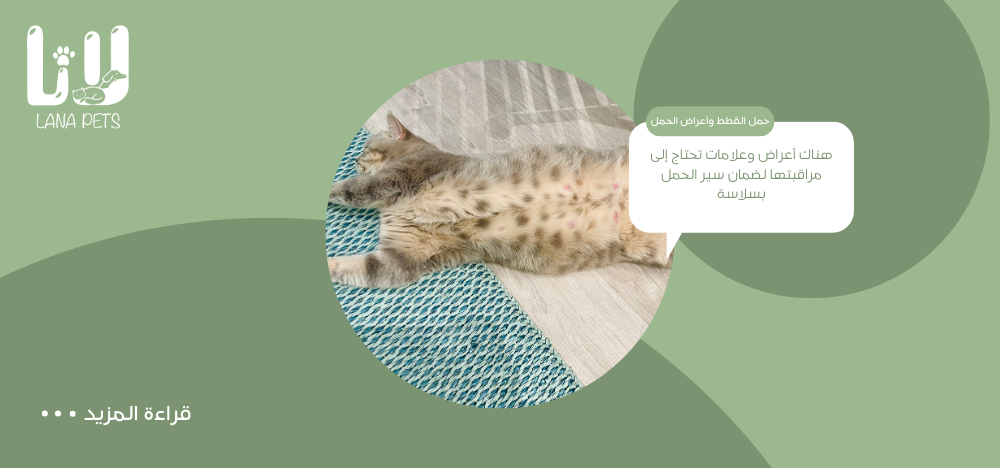
Understanding the duration of a cat's pregnancy and the associated signs is crucial for any cat owner looking to care for a pregnant cat. Although a cat usually appears healthy during pregnancy, there are symptoms and signs that need to be monitored to ensure the pregnancy proceeds smoothly. In this article, we'll cover all aspects of feline pregnancy, from its duration to the symptoms that may indicate pregnancy.
How long does a cat's pregnancy last?
The gestation period for cats typically lasts between 63 and 67 days, equivalent to about two months. This period varies slightly depending on the cat's breed and size, but generally falls within this range. For example, Persian cats—known for their long hair and docile personalities—also gestate within this time frame. It is important to monitor the pregnant cat's health throughout this period and ensure proper nutrition and medical care are provided when necessary.
Signs of pregnancy in cats
Signs of pregnancy usually begin to appear three weeks after mating. The most prominent of these signs are:
- Swollen and discolored nipples: These are the first noticeable physical signs. The nipples become pink and swollen.
- Increased appetite: A pregnant cat begins to eat more food to meet the needs of the kittens growing inside her.
- Lethargy and increased sleep: Pregnant cats become less active and focus more on resting.
- Abdominal bloating: By the fourth or fifth week, the kitten's abdomen begins to swell noticeably as the fetuses continue to develop.
It is important to monitor these signs to ensure the pregnancy is proceeding normally and that the cat is receiving the necessary care.
How do you calculate a cat's due date?
To accurately calculate the due date, you can start from the day of mating and track the period of 63 to 67 days. During this period, the cat will begin searching for a safe, quiet place to give birth. In the final weeks of pregnancy, the cat becomes increasingly searching for a comfortable place and begins building a "nest" in a secluded spot in preparation for giving birth.
Make sure to prepare a clean, warm, and quiet place well in advance of the birth date, so that the cat will be comfortable there when it comes time to give birth.
How many kittens does a cat give birth to the first time?
During her first birth, a cat may give birth to between one and six kittens. This number may increase or decrease depending on the cat's size and breed, but this is the general average. It is important to monitor the cat's condition during birth and provide assistance if necessary. In most cases, birth occurs naturally without intervention, but if you notice any difficulties, it is recommended to consult a veterinarian.
Cat care during pregnancy
Caring for a pregnant cat requires some extra effort to ensure her safety and that of her kittens. Here are some important tips for caring for your cat during this period:
- Good nutrition: A pregnant cat needs a diet rich in protein and essential nutrients. It is preferable to use Cat food specifically for pregnant or young cats, which contains a high percentage of protein and fat to support the growth of the fetus.
- Veterinary Visits: Take your cat to Lana's Veterinary Clinic regularly to ensure the pregnancy is proceeding normally. The vet will help determine the cat's health status and provide advice on how to deal with any problems that may arise.
- Comfort and security: During the final weeks of pregnancy, your cat will need a quiet, safe place to relax. You may notice your cat starting to seek out dark, secluded areas. You can provide her with a comfortable bed or a dedicated box to prepare her for giving birth.
Abnormal symptoms that a pregnant cat may experience
Although cat pregnancy often proceeds smoothly, some symptoms may appear that require medical attention:
- Diarrhea and vomiting: Vomiting may be a normal symptom resulting from hormonal changes, but if it persists for long periods, you should consult a doctor. Diarrhea, however, is not a direct sign of pregnancy and may indicate another health issue, such as a parasitic infection or digestive problems.
- Extreme lethargy or apparent pain: If you notice your cat seems unusually tired or complaining of pain, this may be a sign of a problem that requires veterinary intervention.
- Abnormal discharge: If abnormal vaginal discharge occurs before your expected delivery date, it may be a sign of a problem that requires medical attention.
What happens when kittens give birth at home?
The birth process can take between 2 and 6 hours, depending on the number of kittens. The cat will begin to feel contractions and search for a quiet place to give birth. Make sure she is not disturbed and leave her in a calm and safe environment. In most cases, the cat gives birth naturally without the need for intervention. However, if you notice any difficulties or the cat is experiencing problems during delivery, it is best to consult a veterinarian immediately.
Conclusion
Understanding the duration of feline pregnancy and its symptoms can help cat owners provide the necessary care during this delicate period. Always ensure that your cat is monitored regularly and provided with appropriate nutrition. If you are new to cat care, monitoring pregnancy signs and providing a safe environment for your cat will make the birthing experience smoother and more comfortable for everyone.

